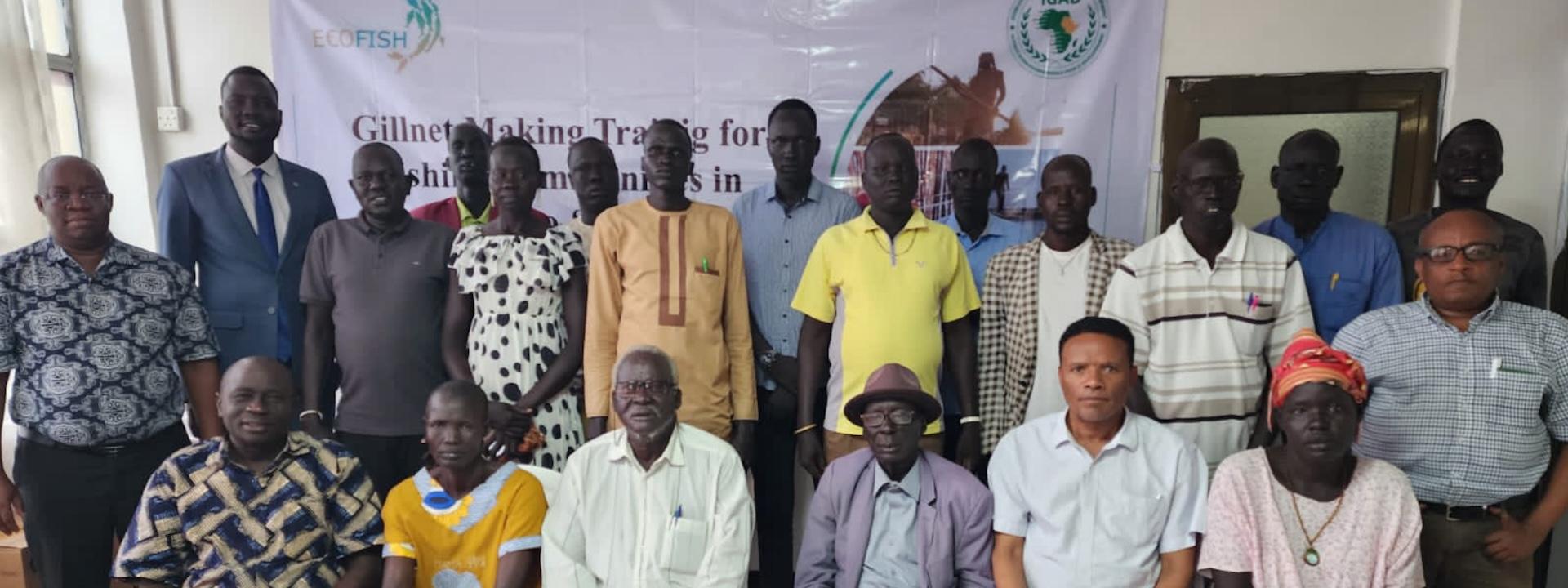August 15, 2024 (Bor, South Sudan): The Intergovernmental Authority on Development (IGAD), through its European Union funded ECOFISH Project, together with the Ministry of Livestock and Fisheries of the Republic of South Sudan, hosted a three-day gillnet making practical training to the fishing communities in the Baro-Akobo-Sobat Basin, Bor Town, Jonglei State (South Sudan).
South Sudan has relatively unexploited fish stocks compared to other inland fisheries of IGAD region. These fisheries need to be managed by providing appropriate fishing gears and crafts to support the management efforts. To achieve this the ECOFISH project introducing the co-management concept.
This co-management principles document in the Baro-Akobo-Sobat Basin; prepared with a view to involve the fishing communities during decision making for the management of the fisheries. Fisheries co-management units have been established in the Basin by the project to pilot the fisheries co-management plan implementation. Capacity gap identification assessment was conducted in the Omo-Turkana and Baro-Akobo-Sobat basins and one of the recommendations was to abolish the destructive and illegal monofilament fishing net being used by the fishers due to the scarcity of the legal multifilament gillnet.
The trained community members in the two basins are being equipped with skills to make gillnets which can also be a source of livelihoods through selling to the local fisher communities. Therefore, this gillnet making practical trainings will enable the targeted women and youth to contribute to the reduction of the illegal and indiscriminate monofilament gillnets uses and it will serve also as one source of livelihood diversification.
In his Welcome remarks, Dr. Eshete Dejen, Programme Manager for Sustainable Environment Protection Unit of IGAD, on behalf of the IGAD Director for Agriculture and Environment Division, acknowledged the presence of Mr. James Manyang Riak from the Ministry of Foreign Affairs, as well as the National Director General of Fisheries and Blue Economy, Mr. Jackson Muso. He thanked the Government of South Sudan for welcoming the IGAD team and the support it has always accorded to IGAD. He noted that the use of monofilament gillnets has been disastrous to the fisheries sector due to its indiscriminate nature when it comes to catching fish. It is important to use multifilament gillnets for sustainability of the fish stocks, and that is why IGAD is training fisher communities in making and mending the multifilament gillnets.
Mr James Manyang Riak from the Ministry of Foreign Affairs welcomed the IGAD delegation and thanked them for facilitating the practical Gillnet making training to the fisher community. “Jonglei State depends on fishing, and IGAD’s advocating against the use of monofilament gillnets is necessary for sustainable fishing. Monofilament gillnets nets result in indiscriminate fishing,” he said. He encouraged the participants to take the training seriously.
The Director General for Fisheries from Jonglei State, Mr. Geu Wunthony Gak welcomed national government officials as well as the IGAD team to the State. Mr. Geu expressed his gratitude to IGAD and to the national government for supporting the fishing communities in his State by training them on the net making skills.
The objectives of the gillnet making training included to equip the skills to produce multifilament fishing gillnets by the fishing communities; to encourage legal fishing gear utilization by the fishing community; to diversify sources of livelihoods of the fishing communities; and to build capacity of local fishing communities to reduce the use of illegal fishing gears.
Background
The Intergovernmental Authority on Development (IGAD) is one of the implementing Regional Economic Community for the ECOFISH Programme, a Cross-Regional Initiative funded by the 11th EDF to leverage regional cooperation for enhancing sustainable inland and marine fisheries in Eastern African, Southern Africa and the Indian Ocean (EA-SA-IO) region. IGAD applied and was granted a 3-year project on: Support to Sustainable Utilisation, Development and Management of Two Transboundary Basins Fisheries of Baro-Akobo-Sobat River Basin (BASRB) shared between Ethiopia and South Sudan, and Lake Turkana Basin (LTB) shared between Ethiopia and Kenya.

